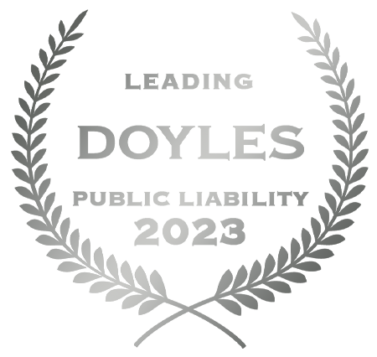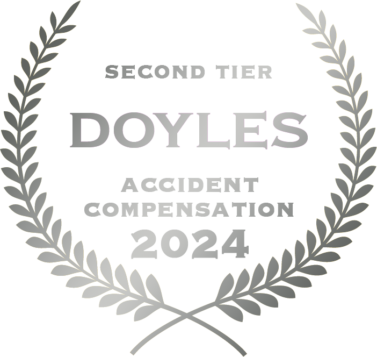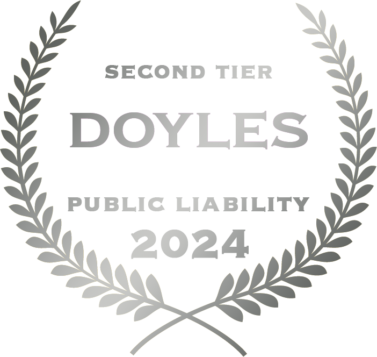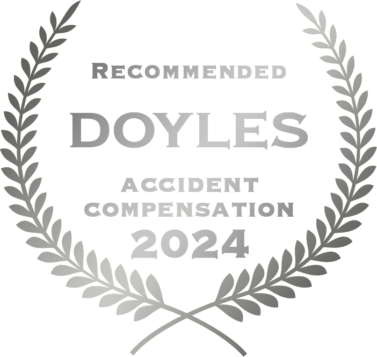
Accident Compensation Claims and Payouts – Your Guide.
If you’ve been injured in an accident and incurred any treatment costs or had any time off work to recover, you may be entitled to claim an accident compensation payout. For more serious injuries these payouts can include substantial lump sums. But they’re not paid to you automatically and many people fail to claim their full entitlements.
This guide is compiled from the collective experience of our top personal injury lawyers across thousands of successful accident compensation claims. It explains everything you need to know about compensation payouts, who can claim, how payouts are calculated, and how to get free legal help and make sure you get the maximum amount you’re entitled to.

Accident compensation claims – what you need to know.
Here are the most common situations we come across with clients enquiring about accident compensation claims:
The amount of compensation you can claim isn’t a fixed amount – it depends on factors like your age, pre-accident income, and how serious your injuries are. However, the amount you receive will also depend on how thoroughly your claim is prepared, and whether it takes into account the full impact of your injury on your life. This article includes a section on ‘how to get the maximum compensation payout’ that explains this in more detail.
This is a common concern, and many people do risk missing out by simply submitting a claim and assuming they’ll be paid everything they’re entitled to. Read on to learn more about your full entitlements and how to claim all of them.
Many of our clients come to us with this question. If you’ve been offered an early settlement by an insurer, you should definitely get it reviewed by a specialist lawyer before you accept. In our experience, many of the compensation payouts we win for our clients far exceed the initial offer that was made by the insurer.
Accident compensation claim story: Mark was awarded $650,000 after being told he couldn’t make a claim.
After suffering an accident in hospital while he was recovering from a stroke, Mark contacted a couple of personal injury lawyers, only to be told he didn’t have a claim. Eventually, he called Law Partners, and we took time to thoroughly review his situation. The result was a $650k compensation payout for Mark, allowing him to retire from work and focus on his recovery. Read Mark’s full story here.
What’s an accident compensation claim payout?
A compensation payout is an amount that’s paid to you to compensate you for losses you’ve incurred from being injured. The term ‘payout’ is widely used, however it’s important to understand that a payout may include regular weekly payments (statutory benefits) as well as lump sums.
Here’s a summary of what you can claim if you’re eligible:
- If you’ve had time off work, you’ll be paid back for your lost wages.
- If you’ve had medical or care expenses, these will be paid back to you.
- Depending on your injuries, you may also be entitled to lump sum payments for future lost wages, permanent impairment or pain and suffering.
Your total compensation payout amount will depend on how you were injured, your age and the extent of your injuries.
Lump sums for pain and suffering compensation and permanent impairment generally apply to more serious injuries. But serious injuries can develop over time and can include other complications such as psychological illnesses. This is why many people fail to claim their full benefits. If you only claim for your obvious injuries, you may miss out on potentially large lump sum compensation payouts.
Read on to learn more about compensation payout amounts that may apply to your own situation.
Are you entitled to an accident compensation claim payout?
You may be able to claim the following accident compensation payouts if you’ve been injured in NSW:
- A motor vehicle accident payout under the NSW CTP scheme if you’re injured in a motor accident as a driver, rider, passenger, or pedestrian. Even if you were the driver at fault, the CTP scheme provides weekly compensation benefits.
- A work injury compensation payout if you’re injured at work, regardless of whether you were at fault.
- A public liability payout if you’re injured in a public place like a supermarket; for example, if you slip and fall and your accident was caused by someone’s negligence.
- A medical negligence payout if you’re injured or become ill as a result of medical negligence.
- A TPD payout if you’re unable to return to work after any injury or illness. A TPD payout isn’t actually a compensation payout – it’s a lump sum you may be entitled to through insurance that’s included in most superannuation funds.
For information specific to Victorian WorkCover claims, refer to our Workers Compensation Payout Guide Victoria.
What’s the average payout for an accident compensation claim in Australia?
Compensation payout amounts depend on the type of accident and the extent of your injuries. Here are some NSW statistics on compensation payouts:
- Motor vehicle accidents: According to SIRA (the State Insurance Regulatory Authority), in the 12 months to October 2024, around 12,000 motor accident injury claims were reported in NSW, and $1.5 billion was paid out in benefits and lump sums. That’s $125,000 paid out for every new claim reported.*
- Workers compensation: In the 12 months to July 2024, 115,332 workers compensation claims were submitted in NSW, and $6.2 billion was paid out in benefits and lump sums. That’s $53,758 paid out for every new claim submitted.*
- Medical negligence: According to data obtained by the Northern Daily Leader**, the average compensation payout by the Hunter New England Health Service in NSW between October 1, 2016, and October 1, 2018 was more than $650,000. However, this figure is considered high and it’s likely that the average across NSW is lower.
- TPD claims: TPD payout amounts typically range between $60,000 and $300,000, with many payouts being over $200,000. You can find your insured benefit amount on your superannuation member statement if it has an attached TPD policy.
*Based on SIRA Open Data, October 2024.
Call 13 15 15 or chat to us now for free advice
Chat nowFind out how much you can claim.
Get startedAccident compensation claim FAQs.
Here are some frequently asked questions about personal injury compensation payouts:
Can I claim a whole person impairment payout for my accident injury?
Whole person impairment (WPI) is a scale used to measure the severity of your injuries – a higher WPI can result in a higher compensation payout. For example, if you’ve been injured in a work accident and your WPI is 11% or more for a physical injury or 15% or more for a primary psychological injury, then you may be entitled to receive a permanent impairment lump sum payout. Emergency service workers may be entitled to a permanent impairment payout even if their WPI is less than 10%.
This assessment process reinforces why having a good compensation lawyer on your side and getting a thorough injury assessment are vital to your claim. If any of your injuries are overlooked, you could miss out on a potentially significant lump sum payment.
For more information on this, refer to our whole person impairment compensation calculator and guide.
Can I claim a pain and suffering compensation payout for my accident injury?
Pain and suffering payout amounts range from $7,500 to $761,500*. Your payout amount is based on how much you’ve been impacted compared to the ‘most extreme case’ (MEC).
Pain and suffering compensation applies to motor accidents, public injuries and medical negligence claims, but isn’t generally available to people injured at work (with the exception of emergency service workers). It’s for the harmful impact the injury has had on your life, physically and mentally. It’s also referred to as general damages or non-economic loss.
* As of November 2024.
What is a serious injury claim payout?
There’s no specific ‘serious injury’ category for personal injury claims, however, claims involving serious injuries across all claim types are more likely to include lump sum payouts. Remember that personal injury compensation is to cover your losses, often where your injury is caused by someone else’s negligence. Depending on the circumstances of your accident, if your injury is severe, this can include future loss of earnings (i.e. compensation for the earnings you would have made if you hadn’t been injured) and non-economic loss in the form of pain and suffering.
Can I claim a back injury compensation payout?
Compensation payouts for a back injury in Australia can also be substantial, especially where the back injury prevents you from working. In severe cases, a back injury compensation payout may include payment for future loss of earnings and pain and suffering. Back injury compensation payouts for less serious injuries, for example where a full recovery is made, will generally be limited to economic losses such as lost wages, and medical and treatment expenses. For more information, read our guide to back injury payouts Australia, or if your injury happened at work, read our back injury at work claims and payouts guide.
Can I claim a PTSD compensation payout?
PTSD is considered a psychological injury, and PTSD compensation payouts in Australia can be substantial. In severe cases where the cause is job-related and the sufferer cannot return to work, PTSD payouts in Australia may be available through workers compensation as well as through total and permanent disability insurance policies connected with superannuation funds.
For more information, read our article on compensation payouts for PTSD in Australia.
If you have a specific question about claiming a compensation payout, you can get free advice from a personal injury lawyer by calling 13 15 15.
How is your accident compensation claim payout calculated?
Using a work injury accident compensation payout as an example, here’s a basic overview:
First, your weekly benefits are generally based on:
- How much you’ve lost in wages by being off work.
- All the medical expenses you’ve incurred, including the cost of travel and any home help you’ve needed.
To determine whether you’re entitled to a permanent impairment lump sum:
- Your injuries and your degree of permanent impairment need to be assessed by an approved doctor.
- Your permanent impairment lump sum payment will be calculated based on the table below (updated June 2024):
| Degree of permanent impairment | Compensation range |
| 0 – 10% | $0 |
| 11% – 20% | $22,480 – $62,770 |
| 21% – 30% | $51,880 – $100,470 |
| 31% – 40% | $83,040 – $162,450 |
| 41% – 50% | $131,440 – $224,550 |
| 51% – 60% | $242,010 – $396,570 |
| 61% – 70% | $376,030 – $568,550 |
| 71% – 74% | $510,040 – $654,540 |
| 75% – 100% | $577,050 – $740,550 |
benefits guide – June 2024
Finally, if your WPI is greater than 15% and your employer’s negligence caused your accident, you might also be entitled to an additional lump sum payment – this is called work injury damages. For detailed information on work injury damages, read our workers compensation payout guide.
For more specific information on how other claim payouts are calculated, refer to the following guides:
- Car accident claim guide
- Medical negligence payout guide
- Public liability claim guide
- Superannuation disability payouts guide
Can you sue for pain and suffering in Australia?
If you’ve been injured in an accident in NSW, you can claim a lump sum for pain and suffering compensation in the following situations, if your degree of permanent impairment reaches the required threshold:
- Injured in a motor accident and your injuries are classified as ‘above threshold’
- Injured in a public place, such as a shopping centre or supermarket
- Injured through medical negligence
Note: in NSW you can only claim a workers compensation (WorkCover) pain and suffering payout if you’re an emergency service worker. However, all workers can claim for permanent impairment, which is essentially a lump sum payment to compensate you for the overall effect your work injury has had on your life. You must have 11% or more permanent impairment for a physical injury or 15% or more for a primary psychological injury to be entitled to receive a permanent impairment payout, unless you’re an emergency services worker.
Call 13 15 15 or chat to us now for free advice
Chat nowFind out how much you can claim.
Get startedWhat’s a reasonable pain and suffering payout?
Pain and suffering payout amounts range from $7,500 to $761,500*. Your payout amount is based on how much you’ve been impacted compared to the ‘most extreme case’ (MEC).
Here are some simple guidelines to help you understand how pain and suffering compensation is awarded:
- If you’re claiming a motor vehicle accident payout, you’re entitled to pain and suffering if you exceed the 10% whole person impairment threshold – this is a measure of the permanent damage the accident caused, and your pain and suffering payout will be determined by a judge.
- If your injury was caused by an accident in a public place or by medical negligence, a judge may award pain and suffering if your circumstances are greater than 14% of the “most extreme case”.
Pain and suffering compensation payouts usually form part of an overall settlement. Take for example the case of a single NSW mum who was awarded a lump sum payout of $1M for her pain and suffering, past and future economic loss and domestic assistance for life after sustaining serious injuries in a car accident in May 2019.
For more information refer to our pain and suffering calculator article.
The calculation of pain and suffering compensation settlements is subjective and complex. At Law Partners, we have extensive experience with pain and suffering lump sum claims, and we win over 99% of our cases. Call 13 15 15 for free legal advice on your claim.
* As of June, 2024.
How do you respond to an accident compensation settlement offer
Don’t be tempted to accept the first settlement offer you receive.
When you claim compensation, you’re generally claiming against the insurer of the person or business that caused your injury, and it’s not in the insurer’s interest to pay out your maximum entitlements. So, an initial settlement offer from an insurer is likely to be less than they’re actually willing to pay you. However, simply asking for a higher payout is not the best strategy. It’s important to look closely at how the settlement amount was calculated, address each aspect of the offer, and dispute the calculations with evidence to support your position.
Of course, this requires a solid understanding of personal injury law, and it’s very hard for the average person to know what is a good settlement offer. So, getting the right compensation advice from a specialist personal injury lawyer is essential. Even if you decide not to engage a lawyer, it makes sense to get free legal advice and understand your options before you accept any offer. You can call us on 13 15 15.
How are accident compensation settlements paid?
Once you’ve agreed on a settlement with the insurer, your personal injury settlement money will generally be paid into a trust account that’s set up by your solicitor. Your legal fees and disbursements and any other applicable costs will be deducted, then the balance will be transferred into your bank account.
At Law Partners, we make sure there are no surprises at the end of your claim by capping our fees and providing an up-front estimate of what your total fees will be. You should avoid lawyers who charge by the hour, where costs can quickly get out of hand.
How do you claim the maximum compensation payout?
Compensation payout amounts for injuries can be substantial. Here are some tips based on the experience of our top personal injury lawyers across thousands of successful compensation claims:
- Make sure your claim is thorough and submitted on time. If you leave important details out of your claim, it can reduce your payout significantly and you may never know what you’ve missed out on.
- Be thorough with the evidence you submit. For example, if you’re claiming expenses, you need to submit evidence such as receipts for all the expenses you’re claiming.
- Make sure your injuries are thoroughly assessed. This is really important – the injuries from your accident could lead to additional complications over time, and if they do, you may be entitled to more compensation.
It’s likely you’ll get a much higher compensation payout if you have the support of a specialist personal injury lawyer who has a strong track record of success. In particular, if you’re entitled to a lump sum payout or if you get into a dispute with an insurer, you’ll need a good personal injury lawyer on your side.
Law Partners is Australia’s largest specialist personal injury firm, with legal teams that specialise in each area of personal injury law. We win over 99% of our cases, we cap our fees, and our no win no fee lawyers are ready to start your claim today.

Chantille Khoury
Principal
Chantille is a multi-award-winning, preeminent workers compensation specialist with over 20 years’ experience. Having ranked top 6 nationwide in the highest category of the Doyle’s Guide, Chantille is now providing feedback on policy changes for the Personal Injury Commission and government bodies.
Related articles.
Do I have a case?
Our senior lawyers will assess your case for free.




















